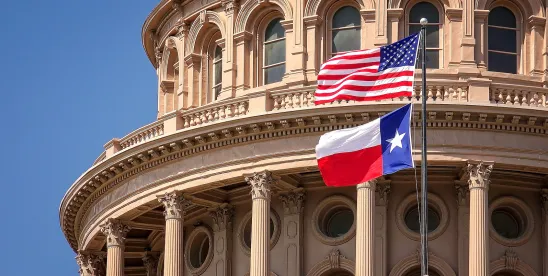Senate Bill No. 17 becomes law on September 1, 2025.
On June 20, 2025, Governor Abbott signed Senate Bill No. 17 to prohibit the purchase or acquisition of interests in real property by individuals domiciled in and companies and organizations with ownership from certain designated countries. The initial “designated countries” are China, Russia, Iran, and North Korea – but the list may expand based on future Annual Threat Assessments of the U.S. Intelligence Community or by designation by the Governor of Texas. The new law, codified in Subchapter H of Chapter 5 of the Texas Property Code, applies to transactions on or after the September 1, 2025 effective date, and does not apply retroactively.
The new law prohibits certain persons and entities from purchasing or acquiring an interest in real property.
Subchapter 5 provides that the following entities, companies, organizations, and individuals may not “purchase or otherwise acquire” an interest in real property in Texas:
- a governmental entity of a designated country;
- a company or organization that is headquartered in a designated country or directly or indirectly held or controlled by the government of a designated country;
- the following individuals:
- an individual who is domiciled in a designated country;
- an individual who is a citizen of a designated country who is domiciled outside of the United States in a country other than a designated country and for which the individual has not completed the naturalization process for becoming a citizen of that country;
- a citizen of a designated country who is unlawfully present in the United States;
- a citizen of a country other than the United States acting as an agent or on behalf of a designated country;
- an individual who is a member of the ruling political party or any subdivision of the ruling political party in a designated country;
- a company or organization that is owned by or the majority of stock or other ownership interest of which is held or controlled by individuals described above; or
- a company or organization that is owned by or the majority of stock or other ownership interest of which is held or controlled by a company or organization described above.
Through the definitions of “company” and “organization”, Subchapter 5 applies not only to corporations, partnerships, and LLCs, but also to business trusts, REITs, banks, and credit unions, among others. Likewise, Subchapter H broadly defines “real property” to cover agricultural land and improvement thereon, commercial, industrial, and residential property, groundwater and other water rights, a mine or quarry, a mineral in place, and standing timber. The House version of Senate Bill No. 17, which ultimately became law on this point, clarified that the prohibition applies to “an interest in” real property, so the prohibition’s scope includes leases of one year or more, easements, and other ownership interests less than fee simple. Finally, the prohibition applies not only to a purchase, but also to an “acquisition”, implicating foreclosures, gifts, and other transfers.
Subchapter H specifies certain exemptions.
In addition to not having a retroactive effect, Subchapter H provides a limited set of exemptions, as it does not apply to U.S. citizens or lawful permanent residents, companies owned or controlled only by U.S. citizens or lawful permanent residents, and leasehold interests of less than one year. The exemptions appear to provide a safe harbor for specific situations, rather than a bright line between prohibited purchases and permitted purchases. The new law invites rulemaking around the exemptions—for example, it does not state whether it applies to the renewal of leases entered into prior to the effective date.
Enforcement.
Subchapter 5 authorizes the Texas Attorney General to investigate a suspected violation, bring an in rem action, and obtain an order to divest an improperly purchased or acquired interest through a court-appointed receiver. In addition to forced divestiture, a “company or entity” that violates Subchapter H is liable for civil penalties equal to the greater of $250,000 or 50% of the market value of the interest improperly purchased or acquired. Individuals who intentionally or knowingly violate Subchapter H may face state jail felony charges. Notably, except for an acquisition of a leasehold interest, a purchase or acquisition in violation of Subchapter H is not void due to the violation—thus, the risk falls solely on the purchaser rather than the seller. The validity of a lease in violation of Subchapter H is unclear: while Subchapter H excludes leases from the “not void” clause, it does not expressly state that such leases are void due to the violation or provide the Attorney General with a specific action to void leases.
Conclusion.
Subchapter H enacts significant—or, depending on its interpretation, potentially sweeping—limitations on investments in real property in Texas by certain foreign investors. Sponsors, developers, fund managers, and investors must prepare to embrace enhanced due diligence and compliance protocols when considering foreign participation in real estate investments in Texas, and must stay apprised of forthcoming rulemaking that clarifies the new law’s applicability.






 />i
/>i
